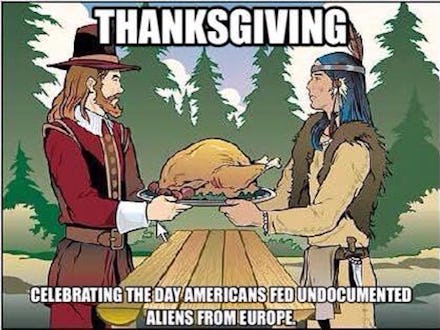One Meme Perfectly Exposes the Hypocrisy of How We Talk About Thanksgiving

For generations, Thanksgiving has become an idealized, commercialized American tradition that centers on turkey and football, largely ignoring the true history of the holiday while conveniently portraying the Pilgrims as benevolent guests at a genial dinner party.
This G-rated version of the holiday is perpetuated by Thanksgiving rhetoric — "going home," "giving thanks," "plentiful"— and imagery that reimagines history in order to whitewash the bloody legacy of the European colonist's treatment of their first hosts.
In other words, we ignore the historical reality of the feel-good holiday in order to perpetuate a fictional version of the founding of America.
Enter the following meme, which captures not just the romanticization of modern Thanksgiving portrayals but also the ironic way the holiday has been appropriated to fit a certain — white — agenda. This much more accurate depiction should be required viewing for all Americans this holiday, especially those who attempt to argue that white people have earned the right to live here in peace.
The meme clearly delineates the ever-evolving notions of patriotism and nationality. Just as Thanksgiving has been called a "cleverly created slice of cultural propaganda, just another in a long line of inspired nationalistic myths," the same can be said for what it means to be an American today.
White Europeans were not the first Americans. They were visitors — illegal aliens, in tea party parlance — in a foreign land that had long been occupied by various Native American tribes.
Conversely, today's concept of "American" is steeped in images of white, middle- to upper-class male citizens. Immigrants — ahem, like our first European settlers — have become politicized, racialized and feared as politicians grappled with immigration reform.
Indeed, America's legacy as a "melting pot" and land of opportunity has been twisted beyond recognition in the name of politics. The meme reminds us of this and encourages us to think critically about our supposed birthright.